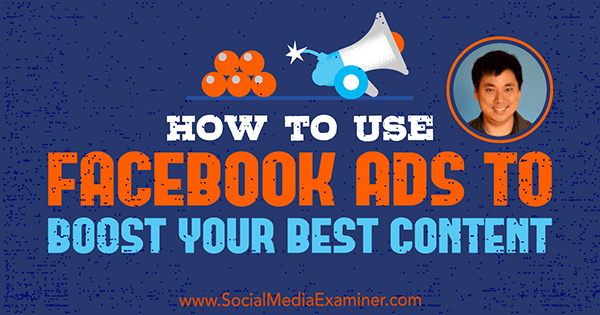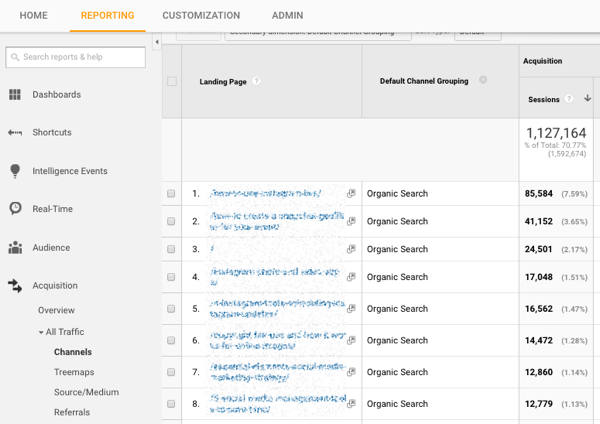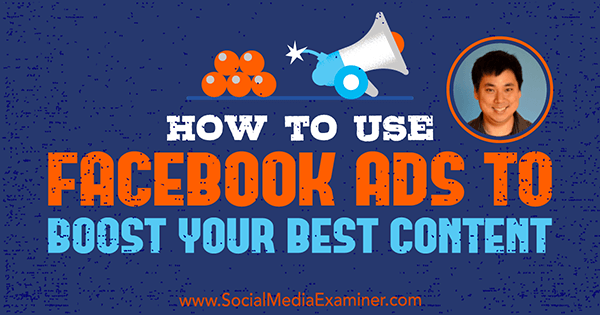Do you use Facebook ads? Here are some of the things you’ll discover in this show: How to Use Facebook Ads to Boost Your Best Content Larry’s Backstory Larry’s company, WordStream, does search engine and social media advertising, and Larry believes that it’s important for businesses to do both types. (Only 1 or 2 people out of 100 engage with the post.) Content that ranks well in Google search tends to do well on social media. Larry says that’s not necessary. Listen to the show to learn how many people Larry typically gets for his webinars. Budgets Larry says that focusing on unicorn posts is the best way to get the most out of your social media advertising budget. (Remember that unicorns are true outliers that perform 2 to 4 times better than average.) When I ask about whom you target when promoting unicorn posts, Larry says that targeting works like a fruit tree. To turn social media advertising into a sale, Larry says the key is remarketing, which allows you to follow people around with ads.
Do you use Facebook ads?
Have you considered creating Facebook ads from your top-performing organic posts?
To explore how to identify and boost your best Facebook content, I interview Larry Kim.
More About This Show
The Social Media Marketing podcast is an on-demand talk radio show from Social Media Examiner. It’s designed to help busy marketers and business owners discover what works with social media marketing.
In this episode, I interview Larry Kim, the founder and chief technology officer for WordStream. He’s a frequent blogger, pay-per-click expert, and social advertising ninja.
Larry explains how to improve the performance of your best content with Facebook advertising.
You’ll discover how to budget for Facebook ads.

Share your feedback, read the show notes, and get the links mentioned in this episode below.
Listen Now
You can also subscribe via iTunes, RSS, Stitcher, or SoundCloud.
Here are some of the things you’ll discover in this show:
How to Use Facebook Ads to Boost Your Best Content
Larry’s Backstory
Larry’s company, WordStream, does search engine and social media advertising, and Larry believes that it’s important for businesses to do both types.
For instance, B2B software companies build new features, functions, and solutions that nobody is searching for yet. However, with social ads, these businesses can target people who are likely to buy their software based on demographics, interests, or behaviors.
Unlike an individual advertiser who has data about only one business, Larry is able to spot trends and patterns in online advertising because WordStream manages approximately $1 billion of ad spending across Facebook, Bing, and Google and runs thousands of campaigns for different clients. WordStream analyzes all of these campaigns to figure out data such as the typical cost per click and typical engagement rates.
Listen to the show to discover the percentage of WordStream’s clients using Facebook advertising.
How Algorithms Work
To understand the algorithms, Larry says it’s important to think about the context in which your ad appears. (Our conversation focuses on Facebook, but Larry says the same is true for ads on Twitter and other social media platforms.) When you sponsor or promote a post, you’re one of thousands or even millions of companies going after the same audience. Larry explains that the Facebook algorithm is designed to handle that volume in a way that keeps Facebook engaging for users so they come back.

To determine which posts to show users and how much to charge the advertiser, Larry believes that the algorithm looks at many different factors, but the main one is engagement (clicks, likes, comments, or shares). A post with low engagement has an engagement rate of 1% to 2%. (Only 1 or 2 people out of 100 engage with the post.) A high-engagement post has a rate of 10% to 15%, and the average is around 2.5% to 3%.
Larry emphasizes that Facebook doesn’t want users’ news feeds filled with ridiculous updates that no one cares about. A company trying to promote garbage content with low engagement rates will be dinged with very few ad impressions. The ad might not even be shown. If the ad does show, the click-through rate will be expensive (a few dollars per click versus a few cents).
The reverse is also true. Facebook rewards companies that promote interesting content by showing their ads and charging only pennies per click.
Listen to the show to hear Larry’s thoughts about how engaging ad content needs to be compared to organic content.
Unicorns
Because algorithms reward engaging content, Larry believes that the winning advertising strategy is simple: promote your unicorns. These outlier posts do spectacularly well. They get three to five times more traffic than the average post and are among the top 1% to 3% of your most engaging content.
For instance, a unicorn post might have a 20% engagement rate, which means 1 in 5 people who see that post click, like, or share it. When you pay to promote a high-engagement piece of content, you may get clicks for just a few cents. It’s a bargain.
To identify unicorn posts, check your Google Analytics for the pieces of content that have gotten tons of traffic organically. Those stories usually do well because the story idea is captivating. For instance, a post like “10 Mind-blowing New Features in Facebook Advertising” is an interesting topic with a catchy title. If the article does well organically, it’s likely to also do well when you promote it as a post.

I ask Larry if you should look specifically in Google Analytics for posts with good social traffic. Larry says that you actually want to look at search traffic, too. There’s a relationship between social shares and Google rankings. Content that ranks well in Google search tends to do well on social media. Over the last year or two, Google has been changing organic rankings to work a lot like the Facebook algorithms. Although Google organic search rankings used to be about links and keywords, the rankings are now about user engagement, such as click-through rates.
Larry stresses that the emotions that make people want to click things in search listings are the same as those that make people want to share and click things on…

COMMENTS